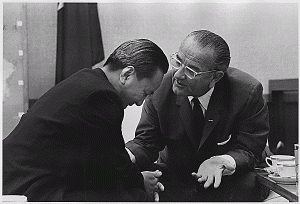Republicans have long bristled at allegations that Richard Nixon's 1968 presidential campaign helped sink Vietnam peace talks to win the election, but Nixon's Asian counterparts -- both in Saigon and Washington -- have been much more open about the collaboration, what President Lyndon Johnson privately called "treason."
In perhaps the most complete account from the South Vietnamese side -- The Palace File by Nguyen Tien Hung and Jerrold L. Schecter -- Hung recounts detailed interviews with his former boss, South Vietnam's President Nguyen van Thieu, and with Nixon's chief emissary to Thieu, China Lobby leader Anna Chennault.
Both Thieu and Chennault described messages from Nixon's campaign urging the South Vietnamese to boycott Johnson's peace talks in the crucial days before the Nov. 5, 1968, election, according to The Palace File, published in 1986. Chennault made similar admissions in her own memoir, The Education of Anna, in 1980.
Upset by LBJ's efforts to negotiate an end to the war with North Vietnam, Thieu followed the Republican advice and -- just days before the election -- balked at the Paris peace talks, thus denying Democrat Hubert Humphrey a last-minute boost that might have cost Nixon his narrow victory. Nixon then continued the war for four more years.
Another key figure in the 1968 dramga was South Vietnam's Ambassador to the United States Bui Diem, who addressed the sabotage allegations in his own memoir, In the Jaws of History, published in 1987.
Bui Diem acknowledged many of the facts about his meetings with Republicans and his infamous cable to Saigon conveying the desire of "many Republican friends" that Thieu "stand firm" against Johnson's pressure. But Bui Diem insisted there was nothing wrong in these contacts and communications.
Despite his claims of innocence, Bui Diem's admissions lend factual support to the case against Nixon. For instance, Bui Diem recounted a private meeting with Nixon at the Hotel Pierre in New York City on July 12, 1968. It was attended by Nixon's campaign manager John Mitchell and Chennault.
At the end of the meeting, "Nixon thanked me for my visit and added that his staff would be in touch with me through John Mitchell and Anna Chennault," Bui Diem wrote.
According to Chennault's account of the same meeting, Nixon also told Bui Diem that as President he would make Vietnam his top priority and "see that Vietnam gets better treatment from me than under the Democrats." [See The Palace File.]
Deeper Distrust
After the meeting with Nixon, Bui Diem said he grew more alienated from President Johnson and the Democrats as they pressed for peace talks to end the war. By then, more than 30,000 American troops had died and the conflict was ripping the United States apart.
"As the Democrats steered with all due haste away from the Indochinese involvement they had engineered, I was increasingly attracted to the Republican side," Bui Diem wrote...
"As far as courting Republicans went, there were few places in Washington like Anna Chennault's penthouse apartment at the Watergate. ..."By October [1968] I was back in touch with Anna, who was now co-chairman of Nixon's fundraising committee, and Senator John Tower, chairman of the Republican Key Issues Committee. I also got together with George [H.W.] Bush and other Republicans from whom I was trying to elicit support for a strong Vietnam policy."
Bui Diem's reference to Bush may seem odd, since Bush at the time was only a freshman congressman from Texas. However, Bush, the son of former Sen. Prescott Bush and the scion of a well-connected Wall Street family, was already emerging as an important behind-the-scenes player in Washington.
Despite his back-bench status in Congress and his relative youth -- then 44 -- Bush made Nixon's short list for vice president before Nixon picked Spiro Agnew. Nixon then recruited Bush to be a leading surrogate for the 1968 campaign.
(In subsequent years, Bush would remain a Nixon favorite, getting financial support from a Nixon slush fund to run for the U.S. Senate in 1970 and, after losing, getting appointments as United Nations ambassador and as Republican National Committee chairman in 1973, when he spearheaded efforts to contain the Watergate scandal.)
Next Page 1 | 2 | 3 | 4 | 5 | 6 | 7
(Note: You can view every article as one long page if you sign up as an Advocate Member, or higher).






